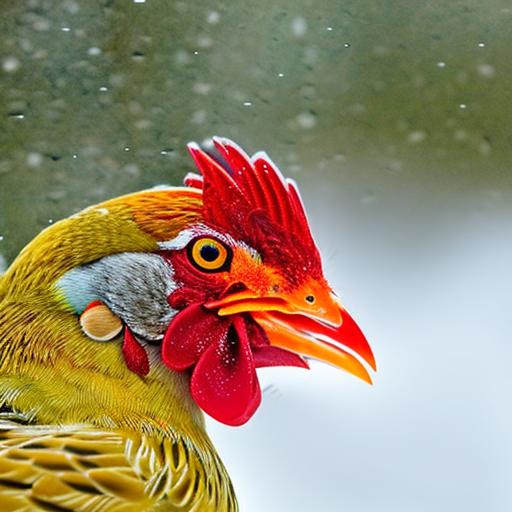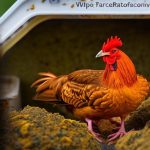Keeping chickens hydrated during the winter months is crucial for their health and well-being. Just like any other living creature, chickens need access to fresh water to survive. However, in cold climates, water can freeze quickly, leaving chickens without a vital resource. Frozen water can lead to dehydration, illness, and even death. In this blog post, we will discuss ways to prevent water from freezing and ensure your chickens have access to fresh water all winter long.
Key Takeaways
- Preventing frozen water is crucial for the health and well-being of chickens.
- Freezing water can cause dehydration, decreased egg production, and even death in chickens.
- Choosing the right watering system and insulating it can help keep water from freezing.
- Heated waterers and deicers are effective tools for preventing frozen water.
- Regularly checking and cleaning the watering system is important for preventing freezing and ensuring access to fresh water for chickens.
The Science Behind Freezing Water and Its Effects on Chickens
Water freezes at 32°F (0°C), which can happen quickly in cold climates. When water freezes, it expands, which can cause damage to containers and plumbing systems. For chickens, frozen water can be a serious problem. Chickens need water to regulate their body temperature, digest food, and stay hydrated. Without access to water, chickens can become dehydrated, leading to decreased egg production, poor feather quality, and other health issues.
Choosing the Right Watering System for Cold Climates
When it comes to preventing frozen water for chickens, choosing the right watering system is essential. Consider using a heated waterer or a double-walled waterer. Heated waterers use electricity to keep the water warm and prevent freezing. Double-walled waterers have an insulated layer that helps retain heat and prevent freezing. Avoid using metal containers as they can conduct cold temperatures and freeze water faster.
Insulating Your Watering System to Keep the Water Warm
| Insulation Material | Effectiveness | Cost |
|---|---|---|
| Reflective Foil Bubble Wrap | High | Low |
| Insulating Foam Tubes | Medium | Medium |
| Insulating Blankets | High | High |
| Insulating Tape | Low | Low |
Insulating your watering system is another effective way to prevent freezing. Use insulation materials like foam or hay to keep the waterer warm. Wrap the insulation around the container or place it underneath the waterer to provide an extra layer of protection against the cold. Additionally, cover the waterer with a tarp or blanket to protect it from wind and cold temperatures.
Using Heated Waterers and Deicers to Prevent Freezing
Heated waterers are a popular choice for preventing frozen water for chickens. These waterers use electricity to keep the water warm and prevent freezing. They often come with built-in thermostats that regulate the temperature of the water. However, it is important to use caution when using heated waterers, as they require access to electricity and can pose a fire hazard if not used properly.
Another option is to use deicers, which are devices that can be added to the water to prevent freezing. Deicers work by heating the water from below the surface, preventing ice from forming. However, it is important to use deicers with caution, as they can be harmful to chickens if ingested in large quantities. Always follow the manufacturer’s instructions when using deicers and monitor your chickens for any signs of illness or discomfort.
Keeping Your Watering System Clean to Avoid Freezing

Dirty water can freeze faster than clean water. Bacteria and other contaminants in the water can lower its freezing point, causing it to freeze at higher temperatures. To prevent freezing, it is important to clean the waterer regularly. Empty the waterer, scrub it with a mild detergent, and rinse it thoroughly before refilling it with fresh water. This will help prevent bacteria growth and ensure your chickens have access to clean and unfrozen water.
Adjusting Feeding and Drinking Schedules to Help Keep Chickens Hydrated
During the winter months, it is important to adjust feeding and drinking schedules to help keep chickens hydrated. Offer warm water or warm food to help chickens stay hydrated and warm. Warm water can be provided by adding hot water to the waterer or using a heated waterer. Warm food can be provided by offering warm oatmeal or other cooked grains. Additionally, adjust feeding and drinking schedules to ensure chickens have access to water during the warmest parts of the day, when the risk of freezing is lower.
Providing Warm and Dry Shelter to Help Chickens Stay Comfortable
In addition to preventing frozen water, providing warm and dry shelter is crucial for the comfort and well-being of chickens during winter. Chickens need a warm and dry shelter to stay comfortable and protect themselves from the cold. Make sure the coop is well-insulated and free from drafts. Provide enough space for all chickens to roost and stay warm. Consider using bedding materials like straw or wood shavings to provide extra insulation and warmth.
Checking Watering System Regularly for Signs of Freezing
It is important to check the watering system regularly for signs of freezing. Even with preventive measures in place, there is still a chance that water can freeze in extremely cold temperatures. Check the waterer daily and if you notice any signs of freezing, replace the frozen water with warm water immediately. This will ensure that your chickens have access to fresh water at all times.
Taking Steps to Ensure Your Chickens Have Access to Fresh Water All Winter Long
Preventing frozen water is crucial for the health and well-being of chickens during winter. By using a heated waterer or deicer, insulating the waterer, keeping it clean, and providing warm shelter, you can ensure that your chickens have access to fresh water all winter long. Remember to check the watering system regularly for signs of freezing and take immediate action if necessary. By taking these steps, you can help keep your chickens hydrated, healthy, and happy throughout the winter season.
If you’re a chicken owner, you know how important it is to keep their water from freezing during the winter months. It can be a challenge, but luckily there are solutions available. In a recent article on Poultry Wizard, they share some helpful tips on how to keep your chickens’ water from freezing. From using heated waterers to insulating the water containers, these tips will ensure that your chickens have access to fresh water even in the coldest temperatures. Check out the article here for more information.
FAQs
What causes chicken water to freeze?
During winter, the temperature drops below freezing point, causing the water in the chicken’s waterer to freeze.
Why is it important to keep chicken water from freezing?
Chickens need access to clean water at all times to stay hydrated and healthy. If their water freezes, they may become dehydrated, which can lead to health problems and even death.
What are some ways to keep chicken water from freezing?
Some ways to keep chicken water from freezing include using heated waterers, adding insulation to the waterer, using a heated base, and using a water heater.
What is a heated waterer?
A heated waterer is a waterer that has a built-in heating element that keeps the water from freezing. It is designed to keep the water at a temperature that is safe for chickens to drink.
What is a heated base?
A heated base is a device that is placed under the waterer to keep the water from freezing. It is designed to keep the waterer off the ground and to provide a source of heat to prevent the water from freezing.
What is a water heater?
A water heater is a device that is used to heat the water in the chicken’s waterer. It is designed to keep the water at a temperature that is safe for chickens to drink.
Meet Walter, the feathered-friend fanatic of Florida! Nestled in the sunshine state, Walter struts through life with his feathered companions, clucking his way to happiness. With a coop that’s fancier than a five-star hotel, he’s the Don Juan of the chicken world. When he’s not teaching his hens to do the cha-cha, you’ll find him in a heated debate with his prized rooster, Sir Clucks-a-Lot. Walter’s poultry passion is no yolk; he’s the sunny-side-up guy you never knew you needed in your flock of friends!







